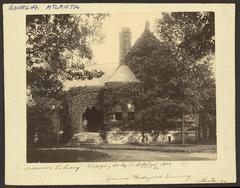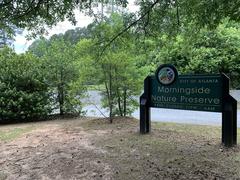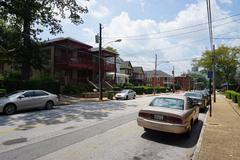Comprehensive Guide to Visiting Atlanta, DeKalb County, United States of America
Date: 13/08/2024
Captivating Introduction
Welcome to Atlanta, a city where every street echoes with the footsteps of history, every bite of food tells a story, and every festival beats with the heart of Southern culture. Envision a place where you can trace the steps of civil rights leaders, savor the aromatic flavors of soul food, and immerse yourself in vibrant, eclectic festivals—all in a single day. Atlanta, often referred to as ATL, is a captivating blend of history, modernity, and culture that promises an unforgettable journey.
Start your adventure in a region once inhabited by the Creek and Cherokee tribes. These early settlers left an indelible mark on the area, which was later transformed by the Georgia Land Lottery Act of 1821, leading to the creation of DeKalb County (Wikipedia). The settlement, initially known as Terminus, evolved through various transformations, becoming the bustling metropolis of Atlanta we know today (Georgia Archives).
Atlanta’s pivotal role in the Civil War and the Civil Rights Movement has cemented its place in American history. From the Battle of Atlanta to the influential leadership of Dr. Martin Luther King Jr., the city’s past is a testament to its resilience and progress (Battlefields, Britannica).
Today, Atlanta and DeKalb County are thriving centers of culture, education, and natural beauty. Whether you’re exploring the historic Oakland Cemetery, marveling at the exhibits in the Atlanta History Center, or hiking the trails of Stone Mountain, there’s something here for everyone (Discover Atlanta). So, let’s dive into this comprehensive guide to visiting Atlanta and DeKalb County, where every corner has a story, and every experience is a new adventure.
Table of Contents
- Historical Background
- Discover the Charm of DeKalb County, Atlanta
- Visitor Tips and Must-See Attractions in Atlanta, DeKalb County
Historical Background
Early Native American Presence
The area now known as Atlanta and DeKalb County was originally inhabited by Creek and Cherokee Native American tribes. The Creek War, which began in 1813, saw the Creeks, allied with the British, attack Fort Mims in Alabama. In response, the United States established a series of forts along the Ocmulgee and Chattahoochee Rivers, including Fort Daniel and Fort Gilmer. Fort Gilmer, located near the Creek village of Standing Peachtree, was later renamed Fort Peachtree (Wikipedia).
Systematic Removal and Land Lottery
From 1802 to 1825, the systematic removal of Native Americans from northern Georgia culminated in the Creek ceding the area that is now metro Atlanta in 1821. The Georgia Land Lottery Act of 1821 created five new counties, including DeKalb County in 1822, with Decatur as its county seat (Wikipedia). The land lottery distributed land to settlers, including Archibald Holland, who received a grant for 202.5 acres near present-day Coca-Cola headquarters (Georgia Archives).
Establishment of Terminus and Marthasville
The settlement that would become Atlanta was initially known as Terminus, designated as the southern end of the Western & Atlantic Railroad in 1837. The name was later changed to Marthasville in 1843, and finally to Atlanta in 1847, a name invented by railroad superintendent J. Edgar Thomson (Georgia Archives).
Civil War and Reconstruction
Atlanta played a significant role during the Civil War, serving as a major railroad hub and supply depot for the Confederacy. The Battle of Atlanta on July 22, 1864, was a pivotal engagement in the Union’s Atlanta Campaign. Union Major Generals William Tecumseh Sherman and James B. McPherson successfully defended against a Confederate offensive led by Lieut. Gen. John Bell Hood. Despite heavy casualties, the Union forces eventually captured Atlanta on September 1, 1864, leading to Sherman’s infamous March to the Sea (Battlefields, Britannica).
Post-War Growth and Development
Following the Civil War, Atlanta underwent significant reconstruction and growth. In December 1853, the Georgia legislature created Fulton County, with Atlanta as the county seat. By 1868, Atlanta had become the capital of Georgia. The city’s strategic location as a transportation hub facilitated its rapid growth, with new railroads, highways, and eventually air transportation contributing to its development (Georgia Archives).
20th Century Expansion
The 20th century saw Atlanta continue to expand and modernize. In 1928, the city annexed residential areas in western DeKalb County, further extending its boundaries. The Great Depression and World War II brought economic challenges, but the post-war era saw a resurgence in growth and development. The construction of new infrastructure, including highways and the Hartsfield-Jackson Atlanta International Airport, positioned Atlanta as a major transportation and economic hub (Wikipedia).
Civil Rights Movement
Atlanta played a crucial role in the Civil Rights Movement of the 1950s and 1960s. The city was home to several key figures, including Dr. Martin Luther King Jr., whose birth home and the Martin Luther King Jr. National Historical Park are significant landmarks today (Discover Atlanta). The movement’s impact on the city is commemorated through various museums and historical sites, highlighting Atlanta’s role in the struggle for racial equality.
Modern Era and Gentrification
In the late 20th and early 21st centuries, Atlanta experienced significant gentrification, revitalizing many of its intown neighborhoods. The 1996 Summer Olympics brought international attention to the city, leading to the construction of new facilities and infrastructure. By the late 1990s, Atlanta’s airport had become the busiest in the world, further cementing the city’s status as a global transportation hub (Wikipedia).
Key Historical Sites and Attractions
- Martin Luther King Jr. National Historical Park: Located at 450 Auburn Avenue, this park includes Dr. King’s birth home, church, and final resting place (Discover Atlanta).
- Oakland Cemetery: Established in 1850, this historic cemetery is the final resting place of many notable Atlantans, including Margaret Mitchell and Maynard Jackson (Discover Atlanta).
- Atlanta History Center: Located at 130 West Paces Ferry Road, this center offers extensive exhibits on Atlanta’s history, including the Civil War and the Civil Rights Movement (Discover Atlanta).
- Centennial Olympic Park: Built for the 1996 Summer Olympics, this park is a central gathering place in downtown Atlanta and features the iconic Fountain of Rings (Explore Georgia).
- The Krog Street Tunnel: A graffiti-covered art haven that’s a favorite among locals.
Discover the Charm of DeKalb County, Atlanta
A Bold Beginning
Welcome to DeKalb County, where history meets diversity, and every corner tells a story! Did you know that Clarkston, a city within DeKalb, is often dubbed the most diverse square mile in America? Let’s dive into what makes DeKalb County a gem in the heart of Georgia.
Historical Significance
DeKalb County, born in 1822 and named after Revolutionary War hero Baron Johann de Kalb, is a mosaic of American history. Decatur, the county seat, was a bustling trading post as early as 1823, nestled at the crossroads of two ancient Native American trails (DeKalb History Center).
The Civil War left its mark here, too. In July 1864, the Battle of Atlanta raged around the courthouse and what is now DeKalb Avenue. This battle was pivotal for the Union’s conquest of Atlanta, a crucial Confederate transport hub (DeKalb History Center).
Cultural Kaleidoscope
DeKalb County radiates cultural diversity. Clarkston exemplifies this with its vibrant mix of ethnic restaurants, festivals, and community events. It’s a melting pot of flavors and traditions (Discover DeKalb).
The Michael C. Carlos Museum at Emory University boasts an impressive collection of ancient art, while the Fernbank Museum of Natural History captivates with its natural history exhibits (Discover Atlanta). And don’t miss the DeKalb Farmers Market, a foodie paradise offering a global array of flavors (Discover DeKalb).
Economic Powerhouse
Strategically located along major interstates and near Hartsfield-Jackson International Airport, DeKalb County is a magnet for businesses. Its economy thrives on healthcare, education, and manufacturing, with giants like Emory University and the CDC enhancing its profile (DeKalb History Center).
Natural Wonders
Nature enthusiasts, rejoice! DeKalb County is home to Stone Mountain, Georgia’s top attraction. This colossal granite monadnock has been a ceremonial site for Native Americans for centuries (Arabia Alliance). Despite its controversial Confederate carving, the mountain remains a natural marvel.
Explore Arabia Mountain and Panola Mountain, where hiking and biking trails reveal the region’s unique flora and fauna (Arabia Alliance).
Education Excellence
DeKalb is a hub of academic excellence. Home to Emory University, Georgia State University’s Perimeter College, and Agnes Scott College, the county fosters learning and innovation. Emory’s Michael C. Carlos Museum and the CDC Museum offer enriching educational experiences (DeKalb History Center).
Recreational Haven
DeKalb County is an adventure playground. Stone Mountain Park offers hiking, a scenic railroad, and seasonal festivals. The park’s laser light show and the Skyride to the summit are must-sees (Discover DeKalb).
History buffs will love the DeKalb History Center’s walking tours, while art enthusiasts can indulge at the Callanwolde Fine Arts Center (DeKalb History Center).
Transportation Hub
Getting around is a breeze with MARTA, Atlanta’s rapid transit system, providing easy access to downtown and beyond (Discover Atlanta). Peachtree DeKalb Airport (PDK), Georgia’s second-largest airport, caters to general aviation and corporate flights.
With major interstates and proximity to Hartsfield-Jackson International Airport, DeKalb County is perfect for both businesses and residents seeking connectivity (Discover Atlanta).
Conclusion: Your Adventure Awaits
DeKalb County is a tapestry of history, culture, and natural beauty. Its diverse landscape, rich history, and vibrant community make it a must-visit destination. Ready to explore? Download Audiala, the tour guide app, to unlock the secrets and stories of this remarkable county. Your adventure in DeKalb County starts now!
Visitor Tips and Must-See Attractions in Atlanta, DeKalb County
Welcome to Atlanta: A City of Stories and Surprises
Ready to dive into the heart of the South where history meets hipster vibes? Atlanta isn’t just a city—it’s an experience. From its rich Civil Rights history to its buzzing arts scene, there’s something here for everyone. So, buckle up and let’s explore Hotlanta, where every corner has a story to tell.
Key Attractions: The Must-See Marvels
Atlanta History Center
Step into a time machine at the Atlanta History Center.
Visitor Tips
- Transportation: Navigating Atlanta: Think of MARTA as your trusty old friend—reliable but occasionally quirky. The Hartsfield-Jackson Atlanta International Airport is a major hub for domestic and international flights (Discover Atlanta).
- Best Time to Visit: Spring and fall are ideal times to visit Atlanta, with mild weather and numerous outdoor events and festivals. Summer can be hot and humid, while winter is generally mild with occasional cold snaps (Explore Georgia). Spring brings the blooming dogwoods and the Atlanta Dogwood Festival, while fall is all about the pumpkin patches and football games. Winter? Mild and perfect for exploring without the summer crowds!
- Local Cuisine: Atlanta offers a diverse culinary scene, from traditional Southern cuisine to international flavors. Don’t miss trying local favorites like fried chicken, peach cobbler, and grits (Discover Atlanta).
Cultural Context and Etiquette
In Atlanta, a friendly ‘Hey y’all!’ goes a long way. And remember, when in doubt, always hold the door open—Southern hospitality is no joke!
Myth Busting and Surprises
Myth Buster: Atlanta is not just about peaches! Did you know it’s also home to the largest drive-in restaurant in the world?
Call to Action
Atlanta and DeKalb County are more than just destinations; they are experiences that weave together the threads of history, culture, and innovation. From the early days of Native American settlements to the bustling modern metropolis, Atlanta’s story is one of transformation and resilience. The city’s rich historical tapestry is complemented by its role as a cultural and economic powerhouse, making it a must-visit for travelers seeking a blend of the old and new.
DeKalb County, with its diverse communities and natural wonders like Stone Mountain, offers a microcosm of the broader Atlanta experience. Whether you’re savoring the global flavors at the DeKalb Farmers Market or exploring the educational treasures of Emory University, DeKalb County is a testament to the region’s diversity and dynamism (Discover DeKalb).
As you explore, remember that Atlanta is not just a place—it’s a feeling, a rhythm, a story waiting to be discovered. Download Audiala, your expert guide to the city’s hidden gems and fascinating tales. With Audiala, you’ll uncover the secrets and stories that make Atlanta and DeKalb County truly unique. Your adventure awaits—immerse yourself in the heart of the South and let the journey begin.
References
- History of Atlanta. Wikipedia. Retrieved from Wikipedia
- Atlanta Area Research Resources Handout. Georgia Archives. Retrieved from Georgia Archives
- Battle of Atlanta. Battlefields. Retrieved from Battlefields
- Battle of Atlanta. Britannica. Retrieved from Britannica
- Discover Atlanta. Discover Atlanta. Retrieved from Discover Atlanta
- Guide to Atlanta. Explore Georgia. Retrieved from Explore Georgia
- DeKalb County History. DeKalb History Center. Retrieved from DeKalb History Center
- 10 Must-Dos in DeKalb County. Discover DeKalb. Retrieved from Discover DeKalb
- Uncovering Native American History in DeKalb County. Arabia Alliance. Retrieved from Arabia Alliance















